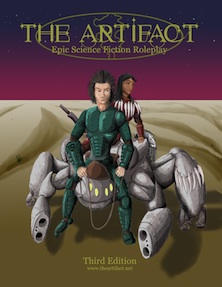In part 3 I mentioned not forcing the players to only focus on the game. That made me realize I hadn’t mentioned anything about player management so here goes.
In Character Vs. Out of Character
When playing an RPG a player can speak as if they were their character or In Character (IC). They can also speak as themselves or Out of Character (OoC). Saying things like “My name is [insert character name here], I’m pleased to meet you.” would be In Character. Saying things like “Hey I downloaded that new song from [insert band name here]” in a historic or fantasy setting is Out of Character.
This can get a little confusing at times. A player may exclaim “What are you crazy?” and mean it to be said In Character. They may have been just commenting on another player’s decision and therefore OoC. There may be no way of telling unless you ask “Are you really going to say that in game?”
Speaking OoC is necessary at times but it’s generally considered good form to keep it to a minimum. That said, most GMs allow a moderate amount of OoC conversation between players. It helps to mitigate player tension and most players will want to converse and joke during a game. There are some hardcore groups that are very strict about not allowing OoC conversations but from what I’ve seen they’re probably the minority. You may however have a player or two that would like OoC conversation kept to a minimum while others want it.
Tension
Player tension is something that a GM needs to learn to gauge. Each player has a different way of expressing the tension they’re under so it gets even trickier. On top of that, having tension in a game is important to a lot of story styles but too much tension is stressful and no fun.
Tension is the emotional feeling that the players have in connection to the difficulties their characters face. No tension means they don’t care what happens. To much tension and players start getting upset and arguments break out. Both extremes need to be avoided, so how do you do that? There are no surefire ways but there are methods that can help.
The first is having a social contract. The simplest form of a social contract is to explain what kind of game you want to run and asking the players if that’s the kind of game they want to play. Things like how dangerous is this game going to be? Will characters die often, occasionally, rarely or never? Are players allowed to harm each other? Should the GM have total control or should the players have an input on how the story unfolds? Will the characters be allowed to make major changes to the story world? Will the rules in the game book be strictly adhered to or only loosely? There are any number of things that can be in a social contract. There’s plenty of reading that you can do on this subject so if you need more pointers, they’re out there. A social contract is important for a new group to run smoothly.
Communication is also important. The players may not express displeasure at something right away out of courtesy. Maybe they hope that you’ll move on to something they like, maybe they feel if everyone else is enjoying the game they shouldn’t say anything.
Pay Attention
As a GM, it’s a good idea to look at facial expressions and pay attention. Five of your players may be smiling and having a great time while one is withdrawn and has their arms crossed. It’s really easy to see the enthusiastic players and somehow miss that one of the players is no longer having fun. Pause the game and privately ask the withdrawn player why they aren’t enjoying things. Do this enough times and they’ll freely ask “Can I talk to you a minute?” the moment they don’t like how things are going. This is a good habit to get into. Don’t argue with them about their point of view. They can’t be wrong about not having fun, they may not express it well and they may not know how to fix things but they’re right that they’re not having fun even if you don’t agree on why. Approach these situations with the goal of making the game fun for them again. Seeing results from these conversations will improve their feeling of Agency which can greatly improve their investment in the game.
Up Last – The After Game Follow Up


 The Free RPG Blog
The Free RPG Blog